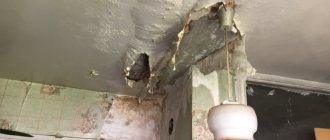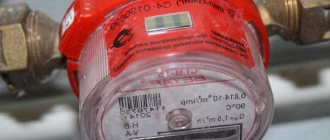Why is this happening?
This problem may have the following reasons:
- heat exchanger contamination;
- heat exchanger failure;
- corrosion inside the pipeline;
- the appearance of rust inside the risers.
The reason may also lie in the shutdown of the heat exchanger in the house. This usually occurs in cases of equipment repair or in case of an accident in external pipeline sections.
Difference in causes for open and closed water supply systems
Both of these systems are different. In open cold water, in order to heat up, it must come into contact with the coolant itself. In a closed system, water is heated by heat exchange.
The difference in the reasons why cold water flows from a faucet instead of hot water is as follows:
- high accident rate of open systems compared to closed ones due to their location (in the event of an accident on the pipeline, the water supply is completely stopped in the entire water supply system);
- low accident rate of closed systems (in the event of an accident, water continues to flow into apartments, going around the damaged section of the pipeline);
- rapid cooling of hot water in open systems due to its unstable distribution;
- stable maintenance of hot water temperature in closed systems, due to which they are less likely to fail.
Open systems often have low pressure, which means hot water does not reach consumers living on the upper floors. This requires the installation of booster pumps. In closed ones there is a large loss of water. They often need inflating pumps.
In such systems, heat exchangers often break down, due to which not hot, but cold water flows into apartment taps.
Legislative aspects
Before deciding where to turn if cold water comes from a hot tap, you should understand the standards established for the temperature of the liquid supplied to your home. Standards for hot water supply are presented in the “Rules for the provision of utility services to owners and users in apartments and private houses.” They are confirmed by government decree No. 354. And also, in the sanitary and epidemiological requirements of SanPiN 2.1.4.2496-09, approved by the leading sanitary doctor of the Russian Federation.
The listed legislative documents read:
- The temperature regime of the aqueous solution in water intake areas must be at least 60°C and no more than 75. In this case, the type of heat supply does not matter.
- Before measuring the temperature of the heated liquid medium, it must be drained within 3 minutes.
The following is stated regarding the maximum deviations:
MBFT-75 Membrane for 75GPD
SF-mix Clack up to 0.8 m3/h
SF-mix Runxin up to 0.8 m3/h
- at night temperature fluctuations of 5°C are allowed;
- during the day - maximum 3.
In accordance with established regulatory requirements, conditions for payment for water resource consumption are formed if actual values differ from those approved by law.
In a situation where H2O is supplied to a residential building below 40°C, it is paid at the cold price. If it fluctuates in the range from 40 to 60, funds are deposited at a reduced rate.
How to find out the reason in a particular case?
To find out the exact cause, you need to check the pipes in the basement of the house.
It is necessary to look at the condition of the pipeline section that approaches the riser. To do this, you need to invite a specialist from the management company to inspect the pipes in the basement of the house.
It is important to check the condition of the risers themselves. You should invite a specialist from the management company to check the risers for the presence of rust inside them.
In any case, you will need to check the operation of the heat exchanger in the house. It is this device that often causes interruptions in hot water supply in homes. Only a representative of the management company, who should be invited to the house upon a pre-submitted application, can check the heat exchanger for blockages and damage.
If the above options do not reveal the cause, then you should contact the water utility and generating companies servicing the house. They are responsible for the condition of the external pipeline.
After filing an application, they are required to send a representative to check the condition of external pipeline sections throughout the area of the possible accident.
Lawsuit
This law is often used to protect the rights and interests of consumers of utility services. And it is especially successfully used in legal proceedings. Most lawsuits end with the court forcing the supplier to recalculate water costs. Therefore, you should not tolerate irresponsible and unprofessional attitude in the field of service.
There are several avenues for advocacy in the utility industry. If homeowners' associations and management companies do not want to respond to complaints, the Housing Inspectorate, the prosecutor's office, and the court have great influence on them.
Instructions for solving the problem
To cope with this problem, you need to follow an algorithm. It is important to know where to go and how to file and send a complaint. A separate point is the possible result of such treatment.
Where to contact?
In such situations, the first instance is the management company. She is responsible for ongoing maintenance work on the pipeline inside the house.
If the reason why cold water comes out of the tap instead of hot water in houses is due to damage to the pipeline in the area outside the houses, then you should contact the city water utility.
In case of accidents at pumping stations, it is recommended to contact the generating company that services the home to resolve the problem with hot water.
How to write an application?
The application is made in a free format. It should indicate the following points:
the name of the management company, water utility or generating company to which the complaint will be sent;- address of these organizations, their head;
- Full name of the applicant and his address;
- the very name “complaint” is in the middle of the line;
- a detailed description of the situation when it was revealed that cold water flows from the tap instead of hot;
- a specific request to the organization to resolve the situation;
- date of writing the document;
- signature of the person applying.
If necessary, you can attach documentation to the complaint that will confirm the fact of improper supply of hot water to the house.
How to file a complaint?
A claim regarding this case must be submitted only in writing. Management companies will not respond to verbal complaints from consumers. The application is sent to the management company in two copies.
A mark is placed on one of them that it has been accepted for consideration. Similarly, the complaint is forwarded to the water utility and the generating company.
Result of the request
The management company must respond to the complaint. She sends an employee to the applicant's house within two days from the moment he filed a complaint.
It measures the water temperature at water intake points. Two such measurements are made.
The first is in the morning, the second is in the evening. Based on the results of the measurements taken, the management company’s employee draws up a report.
It confirms the fact that there is a disruption in the supply of hot water to the apartments. The document is made in two copies. One of them remains with the consumer.
The management company is obliged to make a recalculation based on the act of measuring the temperature at water collection points . For the next period, the consumer who submitted the application should have their DHW fees reduced.
Or he will pay for it at the same rate as for cold water, if the measurement shows the temperature of the hot water below the 40-degree mark.
If the reason lies in contamination of the heat exchanger, then the management company employee cleans it. If the problem is a device failure, the management company replaces it. It is also possible to replace only individual elements of the heat exchanger.
If the pipes become clogged, the management company worker cleans them or completely replaces a separate section of the pipeline. Also, the solution to the problem may be limited to cleaning the screens on the mixers.
Quality complaint
After scheduled work or eliminating the consequences of an accident, hot but rusty water may flow from the tap. As a rule, when contacting the control room, the applicant will be informed of the reason and assured that quality will be restored within a few hours. If this does not happen, then you need to perform the following steps:
- call representatives of the service organization - the call is always recorded in a log with a registration number assigned and the date and time indicated;
- drawing up an act;
- filing a claim with the management company for recalculation.
What to do if the problem is not resolved?
If an appeal to the management company or water utility does not produce results, then you should complain to the housing inspectorate.
She acts as a supervisory authority and monitors the work of the management company.
You should also complain to the housing inspectorate about the inaction of the water utility or the failure of the organization to fulfill its duties.
It controls all organizations involved in the housing and communal services sector.
An alternative option may be to contact the local administration. A written complaint can be submitted through the reception desk. You can also send it via mail.
It is allowed to complain about management companies, water utilities and generating companies to Rospotrebnadzor and the prosecutor's office. Their function is to supervise how housing and communal services organizations carry out their work.
If these authorities do not assist in solving the problem, then you should go to court. It is necessary to file a claim. It can be sent by mail or transmitted through the court office. A number of courts allow filing claims in electronic format.
Where should complaints be filed?
The appeal procedure rarely ends with the filing of a single petition. As a rule, restoration of justice involves sequential submission of applications to a number of authorities :
- the head of the HOA, management company, housing department;
- housing inspection;
- Rospotrebnadzor;
- prosecutor's office
When applying to the next authority, the text of the petition will need to set out the history of interaction with previous officials, attaching, if necessary, copies of correspondence.
Prevention
One of the options to prevent such a situation is to regularly monitor the condition of the heat exchanger in the house. It is recommended to check the condition of the device monthly for blockages and corrosion.
For prevention, the condition of the pipeline in the basements of houses should be checked monthly. Particular attention should be paid to those areas that are connected to risers.
At the first signs of corrosion, the pipes must be cleaned immediately . The same goes for the risers themselves. Their condition must be monitored by designated employees of the management company. At the first sign of clogging, the riser needs to be thoroughly cleaned.
A way to solve the problem could be to install a separate water heater in the apartment.
This is especially true for old houses, in which the pipeline system often fails.
If there are frequent interruptions in the supply of hot water, a water heater will be able to smooth out the problem .
The resident will always have a certain supply of hot water if necessary. But this will inevitably lead to an increase in utility bills for electricity.
One option is also to install water meters with a temperature sensor in the apartment. This device will not solve the problem with the supply of hot water, but will help reduce payments for water if it is supplied to the apartment at insufficient temperature.
A water meter with a temperature sensor will help the consumer monitor the quality of hot water in his apartment.
How can a water heater help?
It is possible that the answer to the question: why cold water runs instead of hot water and what to do in such a situation will be the transition to an autonomous water supply. That is, installing an electric boiler.
The heating device consumes a moderate amount of energy. With low consumption of heated liquid, its maintenance will cost the same as a centralized hot water supply. The volume of the tank is limited to a certain displacement, so when the heated H2O is completely drained from the tank, you have to wait until the next batch of water resource is heated.
One caveat. If there is no hot water metering device, you must install a plug on the riser, officially sealing it. Otherwise, bills for use will continue to arrive. Having a meter is another matter. There is no need to plug the pipe or put a seal. It is enough to close the valve at the inlet and make sure that the liquid medium from the electric boiler does not enter the system.








